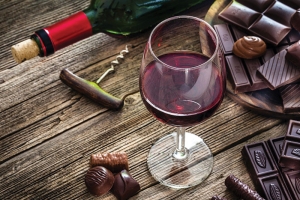Dementia Consulting, Coaching & Counseling for Individuals and Families
The Atwood Blog
Displaying items by tag: red wine
Friday, 05 January 2024 13:02
Red Wine, Dark Chocolate & Bach
When I suggest “brain games” many people cringe and say, “Well, I do the (insert your favorite word game here) every day.” Wouldn’t it be great if there were things we enjoyed doing or consuming that could help our brain health? Seems there are….Red wine, dark chocolate and classical music just for starters.
Red Wine
Resveratrol is an antioxidant found in red grape skins and seeds. It specifically helps brain health: to manage blood pressure and cholesterol reducing vascular dementia; after stroke; and in possible reduced incidence of dementia. Studies show resveratrol itself (which is found in red wine, cranberries, blueberries) has antioxidant, anti-inflammatory and lipid-regulating effects. How much wine depends on which study you read. Some suggest one 4-ounce glass daily; another suggests one 5-ounce glass for women and two 5-ounce glasses for men daily.
Please remember that while there are some health benefits to drinking wine, there are also risks from excessive drinking. You should also check with your doctor to see if alcohol is contraindicated with your medications/health conditions.
Dark Chocolate
Over 90% of Americans planned to give chocolate during the holidays. Stats are impressive when it comes to chocolate. Globally, 16 billion pounds of chocolate are consumed annually, with the Swiss being the highest consuming country (25.5 pounds per person annually). Only 34% of Americans prefer dark chocolate, but that may change when people realize the benefits for brain health.
For many years, scientists have studied the flavanols in dark chocolate (although these antioxidants also are found in various fruits and vegetables). Many studies have touted the antioxidant benefits for all sorts of health issues, including brain health. Scientists have compared various levels of cacao in dark, milk and white chocolate. Dark has the most flavanols. But check your labels – 60% dark chocolate is the minimum you should target if you are eating it for the brain health benefits.
And then again, this may not be a regular treat. A more recent study reported by Consumer Reports (but not peer-reviewed) indicates that lead and cadmium levels are high in dark chocolate, with more negative outcomes than potential benefits. They suggest that 60-70%, and specific brands, have lowest heavy metals. Read more of the study here. It seems we should avoid more than 1 ounce per day, but if you’re concerned, definitely speak with your MD.
Bach
Bach, Beethoven, Handel, Mozart and Chopin are some of my favorite composers. And they are safe – no heavy metals (I know… ugh). Study after study has found improvements in all kinds of cognitive areas when Baroque music has been enjoyed. These include concentration, language, memory retention and retrieval. In fact, several studies found classical music improves neuroplasticity and neuron regeneration after damage. Furthermore, it also helps reduce stress, improve mood, relaxation and motivation. This one is easy to add to our brain health diets, without italicized fine print! Don’t worry about “in moderation” for this one. Enjoy fearlessly.
For years I have endorsed a combination of brain health strategies. A healthy, balanced diet, at least 80% of the time is the current recommendation from scientists studying the MIND Diet. Exercising 150 minutes a week, including aerobic and strengthening work, is also important. As a rule of thumb, what’s good for your heart is good for your head. Also be aware of environmental risks including smoking, pesticides and excessive noise which threatens hearing. And protect your head by wearing seatbelts, helmets and getting concussions assessed quickly. Adding healthy treats and great music enhances our quality of life as well as adds to our brain health regimen.
Resources
For more information, my favorite resources on this topic are the National Institutes of Health, National Institutes on Aging, National Institutes of Neurological Disorders and Stroke, the Alzheimer’s Association, and the Alzheimer’s Society in the UK. Please, for good health, be sure to check with your physician(s) before adding new foods/supplements or drinks to your diet.
Published in
Helpful Tips
Tagged under

Atwood Dementia Group / Live Laugh Learn LLC

